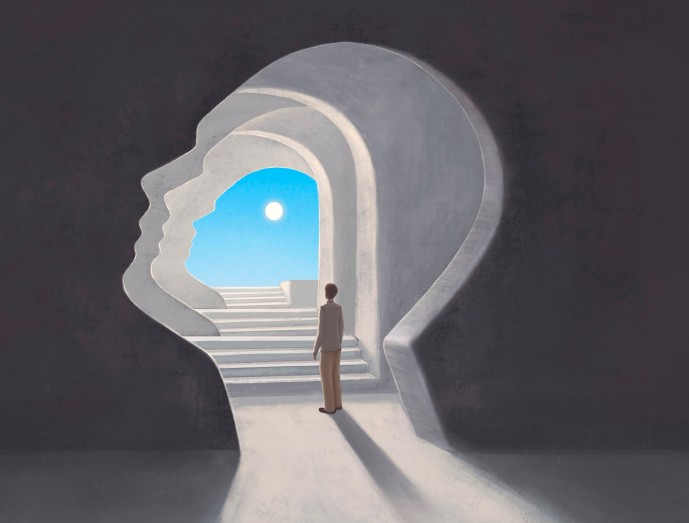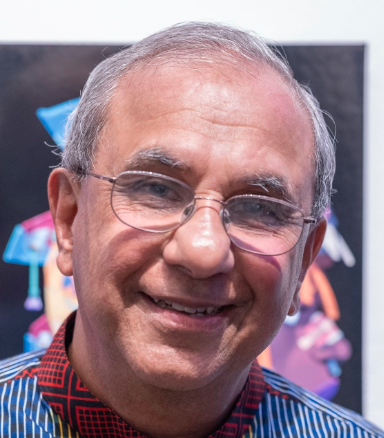The Writing Prompt
– Nonfiction by George K Chandy –

“I never told anybody this, but…”
These were the last words I remember writing at the Third Street Writers’ workshop. It was midmorning in February, two days before Valentine’s day. Nine hours later I woke up in a bed at Kaiser Permanente Hospital, Irvine, wondering how I got there. The better part of a day had vanished from my memory. I was petrified.
“How did I get here?” I asked Susan, my wife.
“Patty brought you home from the creative writing workshop. After the workshop, while walking with her to the post office on Forest Avenue, you told her that you were having a stroke and could not remember anything. You sat down outside while she collected her mail. She alerted me and brought you home. You wanted to lie down. As you walked down the stairs to the bedroom, you fished out an orange from your pocket and wondered how it had got there. Patty told you that oranges had been bought to the workshop by someone. You did not comprehend what she was saying. You seemed very confused and incoherent. Very worried, I brought you immediately to the Emergency Department.”
“When was this?” I asked her.
“Around one in the afternoon”, she replied. You walked in to the hospital holding my hand. The ER physician and the neurologist were both former students of yours. They found you very confused. You could not remember the day, year, and repeatedly asked where you were. Your blood pressure, normally low, was sky rocketing when they admitted you. The doctors were worried that you were having a stroke. They ordered a CT angiogram and an MRI as part of a stroke workup. The doctors have excluded stroke and are considering a diagnosis of transient global amnesia.”
“What is that?”
“Transient global amnesia is a temporary inability to form new memories as well as a loss of recent memory. A deeply disturbing psychological event can trigger it. Did something horrible happen at the workshop? Patty says that you took the writing prompt I never told anybody this, but… and wrote a wonderful short story and read it to the group.”
“I don’t remember writing a story or reading it. Where is the notebook where I write stories and poems?
“Your notebook must be in your backpack at home,” Susan said.
I returned home on Valentine’s day after discharge from hospital. At home, I read the story I had shared with Third Street Writers. I transcribe the story below.
***
I never told anybody this, but I escaped being sold into servitude when I was eight. We were in Calcutta. It was February 1962, sixty-two years ago. I was being sent to a boarding school in the Nilgiri mountains of South India. From the blazing sauna of the city, deafened by cacophony, past beggars, some my age, the clink of metal coins dropping into their tin begging bowls, my parents and I weaved through the chaotic bustle at Howrah station. Ahead of us, a coolie-porter in a red shirt carried my yellow metal suitcase, my name printed on it in black. The platform was teeming with people waiting beside a train with red carriages pulled by a powerful steam engine. I held tight to my parents’ hands. At a carriage, two men were waiting. Many children and their parents milled around. My parents told me that this was the party of students I would be joining. The two men were my teachers. We would journey for three days to reach the school. I was terrified. We entered the train. It was an old wooden sleeping compartment, oozing odors of strangers, hints of betel nut, sandal-wood, mustard oil, fish and spices. I sat with other students. Most students knew each other. They chattered among themselves. In the dim light, their eyebrows, lips and cheekbones were shaded, leaving shadowy patches on faces that appeared rat gnawed in my frightened imagination. I knew no one. Nobody spoke to me. I felt abandoned. The whistle blew and the train steamed out of the station. My parents receded into the distance.
A little while later, a man came by and said there was room elsewhere on the train if anyone cared to go with him. In grey trousers and short-sleeved bush shirt, he sized us up through heavylidded reptilian eyes. His English was spoken with the lilt of central India. He appeared to be a teacher. The other students ignored him. Not knowing any better and being naturally trusting, I agreed to go with the man. I followed him through a few carriages and reached an empty sleeping berth. He asked me to sit there. He told me that we would alight from the train in a few hours and change trains to travel to the school. This was different from what my parents had told me, but I was confused and tired, so I said nothing. I sat by the metal-barred window looking at the passing countryside, listening to the rumble of metal wheels on iron tracks below, tears streaming down my face as I ached for my family.
What saved me was geography. The train’s first stop was Kharagpur. My oldest brother Thomas, an engineering student at the Indian Institute of Technology, had come to Kharagpur station to see me set out for boarding school. When he did not find me with the school party, he asked friends to alert the station master that a child was missing. They recruited others to prevent the train from leaving. My brother went carriage by carriage looking for me. He found me sitting by myself. The adult who had brought me to the seat had disappeared. My beloved brother, wearing the same mustache he wears today, embraced me. I sobbed in his arms, comforted by his familiar scent. I never talked about it again. There was no counseling in those days, no therapist I could talk to. From that day I have been gripped by the fear of being abandoned.
***
That was the entry in my notebook. Patty visited the next day. “Patty, what exactly happened at Third Street Writers?”
She replied, “You read your story. Everyone loved it and said they couldn’t wait to read your book. You and I then walked to the post office. We talked about India. You then began talking with great animation about the beggar children in the movie Slum Dog Millionaire. By the time we reached the post office you said you could not remember anything.”
My son, a psychiatrist-in-training, put the pieces of the puzzle together. “Dad, your creative writing exercise ripped into the open a scary event that you had kept hidden in the depths of your unconscious brain for sixty-two years. That painful memory welled up into your conscious mind. Your vivid imagination, overlaid with mind-images of beggar-children on the streets of India, caused your conscious mind to suggest the horror of the what ifs. What if I had been kidnapped? What if I had been maimed, blinded, limbs broken and set in odd positions, forced to beg on streets, beaten if I did not bring back enough money, sexually molested? By the time you reached the post office, your brain was experiencing profound psychological stress from the terrifying repressed memory blaring into your conscious mind. Your memory circuit shut down. You experienced total amnesia starting from the first line of your story, lasting nine hours. It was a fugue, a dissociated mental state. Your blood pressure soared because of your immense stress. You exhibited a typical PTSD reaction to a terrifying past event.”
He went on to say, “Be grateful Dad. You were not kidnapped. You were saved. You had loving parents. You have been happily married for 47 years. You are loved. You live in a gem of a town on the shores of the Pacific. You have had a fulfilling career. You are blessed.”
Our minds are like the ocean. Painful memories, long suppressed, can bubble to the surface from unfathomable depths and terrify. Actions and intentions imprint our minds. Some are wisps, quickly whisked away. Others take longer to fade. Deeply etched imprints can impact our journey. This painful memory is one such imprint. “No imprint is permanent,” I remind myself, “I will erase this imprint, I will find peace in daily tasks and mindfully breathe, smile and be grateful as I tread lightly step after step.”

About the Author – George K Chandy
George K Chandy, a member of Third Street Writers in Laguna Beach, California, is a retired physician-scientist embarking on expression through creative writing after a long career in biomedical research. His hobbies are reading, walking, history, gardening and creative writing. His greatest joy is spending time with grandchildren and family.
Meanwhile, at Dreamers…
Enter the Dreamers Flash Contest – Due Sept. 30

Submit a fiction or nonfiction story of between 300 and 1000 words for your chance to win! The winner will receive $150 CAD and a copy of the Dreamers magazine.
Dreamers Magazine Issue 20 Now Available

We’re pleased to announce the release of Issue 20 of the Dreamers Magazine, featuring our Place & Home winners. Get your copy now!